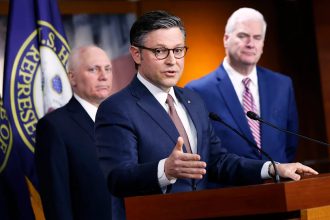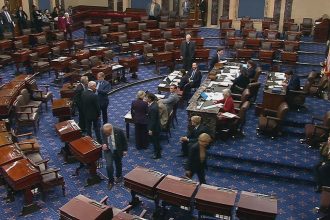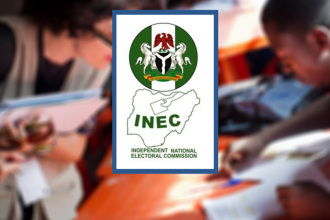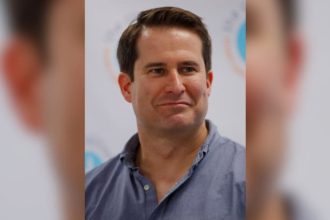Gov. Kathy Hochul once blocked two gas power plants and championed New York’s trailblazing effort to combat climate change.
But as she prepares for what’s expected to be a tough reelection battle next year, Hochul has steered a monumental pivot on energy policy.
On Friday, Hochul approved a new gas pipeline championed by President Trump and cut a deal that will keep a gas-fueled cryptocurrency miner running for five more years. The two decisions have sparked outrage from the progressive environmental wing of her party — with three climate-focused groups pointedly endorsing her primary opponent this week.
“She did not just approve a fossil fuel project. She made a moral choice,” Lt. Gov. Antonio Delgado, who is primarying Hochul, said on Monday. “New Yorkers deserve a governor who does not treat the climate crisis as a PR problem, but as a test of moral leadership.”
Hochul says she is prioritizing concerns about energy affordability and reliability as she rejects more than a decade of climate orthodoxy in New York.
With Trump’s antipathy toward renewables like solar and wind, increasing energy demand and skyrocketing utility bills, moderate Democrats like Hochul are embracing an “all of the above” approach to energy policy.
“We need to govern in reality,” Hochul said Friday. “We are facing war against clean energy from Washington Republicans, including our New York delegation, which is why we have adopted an all-of-the-above approach that includes a continued commitment to renewables and nuclear power to ensure grid reliability and affordability.”
Hochul’s shift reflects a national realignment and recognition by many Democrats that ambitious climate targets are proving more challenging than they’d hoped, and near-term pocketbook concerns, including high energy costs, are a higher priority for voters.
Newly elected Democratic governors in New Jersey and Virginia also focused on energy affordability during their campaigns. Massachusetts Democrats are actively considering legislation to weaken the state’s emissions reduction targets. California has retreated on climate action this year. And Pennsylvania Democratic Gov. Josh Shapiro abandoned his predecessor’s effort to join a regional compact limiting power plant emissions.
Democratic political strategist Morgan Hook said cost-of-living issues, including energy affordability, are what voters care most about.
“The reality is, most people don’t think about their power until it is not there, until they lose it, or when they open their electric bills,” said Hook, a partner with Bluejacket Strategies. “Republicans are starting to talk about energy prices, and it is very clearly starting to become a political issue that is rising up the ranks of those issues that are most important.”
Labor and business support
Hochul’s actions Friday were a welcome signal for some, particularly powerful labor and business interests.
“This is a seismic change in policy direction,” said Gavin Donohue, head of the Independent Power Producers of New York, Inc., which represents power generators including gas plants in the state.
Hochul has been communicating more openness to gas for months as the state’s grid operator has escalated its warnings about potential reliability issues in the coming decade.
“No governor, Republican or Democrat wants to be sitting in their office and having blackouts,” Donohue said. “The reliability numbers… are a real, real eye opener to the governor and I think she’s exerted some political courage on this issue.”
Hochul has delayed mandates to electrify new buildings pending a court decision and wants to revise the state’s landmark 2019 climate law that requires steep emissions reduction New York is not on track to achieve. The governor incensed environmental groups at the beginning of the year when she put an indefinite hold on regulations to limit emissions and charge polluters — and Friday’s decisions reignited that anger.
Left-leaning environmental groups Food and Water Action, New York Communities for Change and Third Act’s New York chapters endorsed Delgado this week. They think Hochul took the wrong message from last week’s Democratic victories including that of Mayor-elect Zohran Mamdani in New York City. Mamdani opposes the pipeline.
“From driving new investments in offshore wind, solar energy, and clean water, to cleaning up industrial waste sites in disadvantaged communities, Governor Hochul has shown that we can address climate change head-on while creating good-paying jobs and lowering costs,” Hochul campaign spokesperson Sarafina Chitika said in a statement.
Pipeline project
The 24-mile Northeast Supply Enhancement pipeline that would bring gas to Long Island and New York City was also issued permits Friday by New Jersey. The project was revived in May by developer Williams Co. after receiving support from the Trump administration.
White House officials indicated Hochul agreed to consider new gas pipelines in New York in exchange for the federal go-ahead for an offshore wind project. Hochul’s office has denied there was any deal.
“She swears she wasn’t under pressure or making a deal with Trump, so to me it’s inexplicable,” Third Act founder and prominent environmentist Bill McKibben said in an email. “Signing up New Yorkers for decades of expensive gas-fired power is a serious loss.”
The project had support from business groups and unions. Proponents said it would lower electricity costs and ensure the reliability of the downstate gas system, which has supply constraints and currently relies on trucked-in gas on the coldest days.
“This approval is a significant milestone in boosting local communities by generating more affordable and reliable energy, lowering utility bills, and providing much-needed economic stimulus that will enable more families to ascend to the middle class,” said Gary LaBarbera, president of the NYC and NYS Building Trades.
Williams Co. also plans to continue working on another pipeline former Gov. Andrew Cuomo blocked on Earth Day in 2016 that would carry more gas into the New England region. The New York Department of Environmental Conservation had pushed Williams for more information on the 124-mile Constitution project and the company temporarily withdrew its application last week.
Williams has touted the potential for that project to lower bills for customers in New York, Connecticut, Massachusetts and Rhode Island by more than $8.5 billion over 15 years.
Energy costs in the region have risen faster than in other parts of the country in recent years, in part because of the reliance on gas and limited supply coming from Pennsylvania and other gas-producing states.
The pipeline approval represents a dramatic departure from more than a decade of New York energy politics under Cuomo, who banned fracking after pressure from progressive environmental advocates, rejected permits for four interstate gas pipelines and signed New York’s 2019 climate law requiring the state to cut emissions to net zero by 2050.
Climate shift
Hochul says the law’s targets are no longer realistic. Some moderate Assembly Democrats, including in upstate New York and downstate suburbs, have similar concerns.
“We’re for decarbonization. We’re for green energy. We want to make it as clean and green as possible,” said Assemblymember Patrick Carroll, who represents part of Rockland County. “We just want people to not have to pay an undue cost to do so.”
Carroll signed on to a letter calling on Hochul to delay a mandate to electrify new buildings over grid reliability and cost concerns. He and some other signatories on that letter support potential changes to the climate law, as well.
Although Mamdani, a Democratic socialist, won big in New York City’s mayoral election, moderate Democrats prevailed in New Jersey and Virginia, Larry Levy, a suburban politics expert at Hofstra University, pointed out.
Suburban voters in places like Long Island will have outsize influence in the general election where Hochul is expected to face off against Republican Rep. Elise Stefanik or Nassau County Executive Bruce Blakeman, Levy said. Long Island residents care about the environment but also reliability and keeping costs down.
“There’s support for what they would consider reasonable projects that can assure the supply of energy and possibly protect its costs, even as they still support green energy,” he said.
But environmental advocates are pushing back on the idea that affordability and decarbonization are at odds.
“We’re not doing enough to install cheap renewable energy,” McKibben said, pointing to a new program in Australia that is offering residents three free hours of power a day thanks to its abundant solar generation.
New York has continued to contract for new renewable energy projects, with ratepayers paying a premium on their utility bills to support the projects. Hochul has espoused continued commitment to advancing those projects before federal tax credits expire.
Gas power plant reversal
On Friday, the same day the Hochul administration approved the pipeline project, the state also settled a lawsuit with a gas-powered cryptocurrency mining operation. The Department of Environmental Conservation plans to issue a permit for the Greenidge plant with the caveat that it will reduce emissions over 5 years.
The state had denied an air permit to Greenidge in 2022, citing the state’s landmark 2019 climate law.
It was a double blow to climate advocates who had been organizing against the pipeline and energy-intensive cryptomining operations.
“This is a disgusting betrayal of New Yorkers and a slap in the face to everyone who fought for our climate law,” said Yvonne Taylor, Vice President of Seneca Lake Guardian.
The Greenidge deal is a stark reversal for the governor who cheered the rejection of permits for downstate gas plants in her first few months on the job. The DEC in those 2021 actions blocked two downstate gas projects that could have supplied additional energy at lower emissions rates than older plants.
Hochul’s administration at the time declared new gas plants incompatible with the state’s climate law. As circumstances and the political winds have shifted, the governor is now embracing new nuclear and potential gas generation to close projected energy shortfalls.
New York’s grid operator is keeping older fossil fuel plants targeted for retirement by state emissions rules online for reliability reasons. They’re likely to be retained to address a forecasted reliability issue in New York City and on Long Island in the next few years.
Hochul cited those reliability concerns as DEC approved the pipeline.
“As Governor, a top priority is making sure the lights and heat stay on for all New Yorkers as we face potential energy shortages downstate as soon as next summer,” Hochul said.









